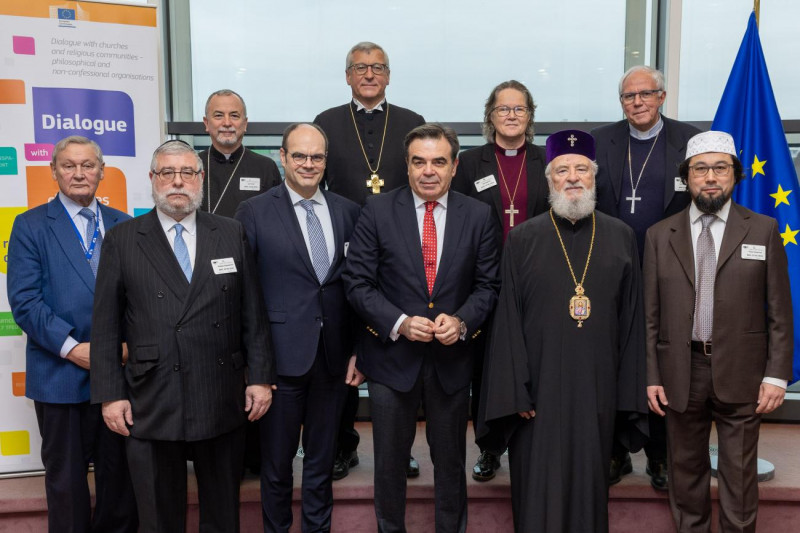
Photo: Christophe Licoppe/EU
Press Release No: 01/23
27 January 2023
Brussels
The Conference of European Churches (CEC) joined religious leaders at the European Commission on 27 January in Brussels to shed light on the impact of the war in Ukraine on the European way of life.
Participants discussed how the war in Ukraine—and the response from the European Union—has been perceived in their countries.
They also shared their concrete experiences with the reception of Ukrainian refugees, the energy crisis, and the impact on the most vulnerable segments of society.
CEC was represented by its president Rev. Christian Krieger and Bishop Åsa Nyström, Church of Sweden.
Christian Krieger expressed his appreciation of the strong commitment and EU’s clear position in handling the situation created by the invasion of Ukraine, notably regarding the economic and military solidarity, the status for refugees and the sanctions.
Krieger noted the paradigm shift the war has caused in Europe, creating a special moment for EU to confirm its values and address its internal challenges.
“It is a time for Europe to assert and defend its values—values that reflect justice, truth, and pathways to peace,” he said, further addressing the impact of the war on inflation, social crises, and the heightened risk to democracies by populist discourse and radical parties.
“Safeguarding plurality, religious freedom and state of law constitutes steps towards the reconstruction of Ukraine,” he added.
The meeting concluded with discussions about the most important issues that the war in Ukraine is raising, and thoughts on what the priority issues for the EU should be.
Nyström spoke about the effects she sees in her diocese, in the north of Sweden, in the Arctic region.
“Many in the younger generations are losing hope for a sustainable future,” she said. “One of the first things that happened when the Russian invasion of Ukraine started, was that the Nordic bishops in the Barents Church Council met to assess the situation.”
This council has been working for over 25 years and consists of nine member dioceses in northern Norway, Sweden, Finland, and Russia from Lutheran and Orthodox churches.
When the invasion started, it radically changed the possibilities for Nordic bishops to work together, Nyström lamented. “The Nordic bishops issued a joint statement, where we condemned the invasion and immediately put the work of the council on hold,” she explained. “This was not only the case for the Barents Church Council, but also other organisations that work in the Arctic region.”
She also described some of the climate change-related university research projects that have been prevented from continuing in the region. “This is a serious issue since the temperature rises four times faster in the Arctic than in the south of Europe,” she said. “To follow the effects of the climate change in the Arctic, across the borders, is essential in order to understand and make decisions about ways to counteract the temperature rise.”
She also expressed concern about Ukrainian refugees, who are increasingly realizing that it may be a long time before they are able to return home. “What will happen after March 2025 when the temporary protection can no longer be prolonged?” Nyström asked.
In the context of war in Ukraine, CEC is carrying out the project “Pathways to Peace” to promote justice, reconciliation and peace. The project will strengthen CEC’s role as a church-fellowship, engaging in dialogue with European institutions, raising a Christian voice to address crucial political concerns.
Learn more about Pathways to Peace
For more information or an interview, please contact:
Naveen Qayyum
Communication Officer
Conference of European Churches
Rue Joseph II, 174 B-1000 Brussels
Tel. +32 486 75 82 36
E-mail: naveen@cec-kek.be
Website: www.ceceurope.org
Facebook: www.facebook.com/ceceurope
Twitter: @ceceurope
YouTube: Conference of European Churches
Subscribe to CEC news